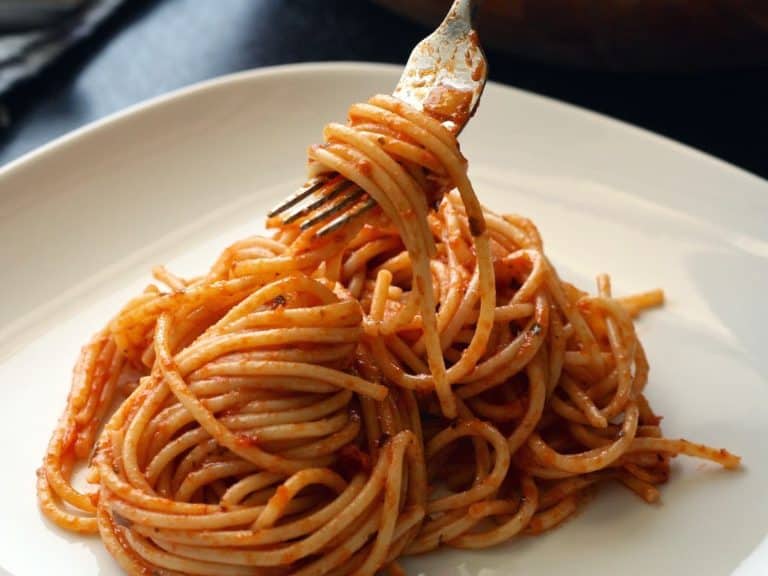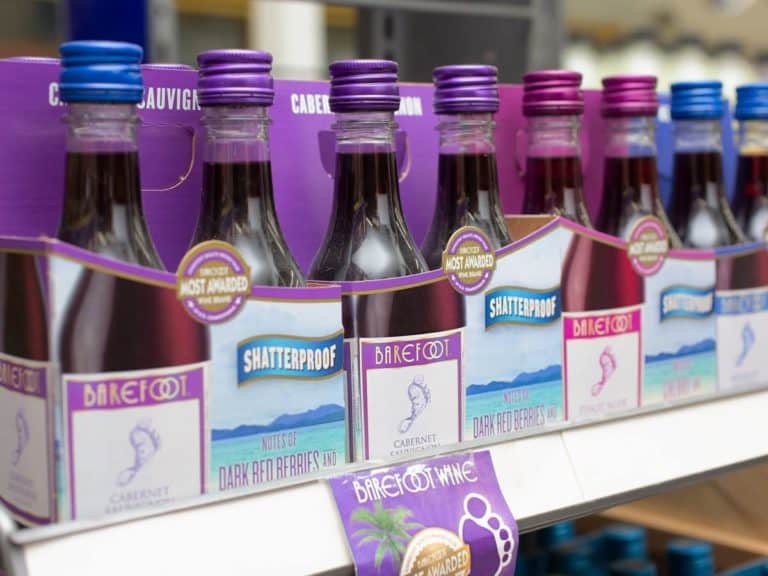Weinkraut vs. Sauerkraut: Similarities and Differences
Fermented foods are some of the healthiest on the planet. That’s because they are packed with good bacteria that offer an assortment of benefits, from improved digestion, bolstered immune system to lifted mood.
One very good example of fermented food is sauerkraut.
Although it can be consumed on its own or added to salads, deviled eggs, burritos, sandwiches and hotdogs, sauerkraut can also be used as a cooking ingredient. As a matter of fact, this fermented cabbage can be cooked with wine and a bunch of other ingredients, too, which results in what’s called weinkraut, which is a traditional German dish.
In this post, we will put the spotlight on both weinkraut and sauerkraut.
Especially if you are into making healthy stuff in your kitchen with your own two hands, you will love the fact that it doesn’t take a lot to enjoy something that tastes so good and is good for your body at the same time!

What’s the Difference Between Weinkraut and Sauerkraut?
Sauerkraut is a world-famous fermented food from Germany. On the other hand, weinkraut is a simple dish that’s made with sauerkraut. Both are tangy and a little sweet. However, since a handful of ingredients are added to sauerkraut to turn it into weinkraut, the resulting dish has a more complex taste.
They sound the same because they are one and the same — except that weinkraut is cooked sauerkraut.
One of the nicest things about sauerkraut is that you can consume it straight from its packaging. And just in case you can’t find weinkraut at the local supermarket or online, you can simply make it from scratch.
In a few, I will share with you an easy-to-follow weinkraut recipe, so don’t stop reading now.
Are Weinkraut and Sauerkraut Healthy?
Sauerkraut is healthy because it has good bacteria. Unlike bad bacteria, the kinds present in the fermented superfood are good for the gut. Weinkraut is healthy, too, because it’s practically sauerkraut. However, added ingredients with calories and fat may offset some of sauerkraut’s health perks.
According to scientists, the following are just some of the benefits sauerkraut brings:
- Improved digestion
- Strengthened immune system
- Lowered heart disease risk
- Regulated blood sugar
- Reduced weight
- Lifted mood
One of the things that make sauerkraut healthy is that it’s high in fiber. But if it’s your first time considering adding the fermented food to your diet, consume sauerkraut in small amounts only at the start.
The same is true for weinkraut, which is just as fiber-rich as sauerkraut. Unfortunately, it no longer packs good bacteria present in sauerkraut as heat can damage them.
How Do You Store Weinkraut?
Weinkraut should be refrigerated within 2 hours after cooking it. Leaving it at room temperature longer than 2 hours can cause bacteria to multiply, making weinkraut unsafe to eat. In the refrigerator, weinkraut can last for about 3 to 4 days without going bad. Refrigerated weinkraut can be served cold or reheated.
It’s true that sauerkraut has a long shelf life, which is common among a lot of fermented foods.
Unfortunately, cooking sauerkraut to turn it into weinkraut can kill good bacteria present, which has preservative properties. And this is why it’s a good idea to refrigerate weinkraut within 2 hours of cooking or when it’s already cool.
Before storing weinkraut in the fridge, transfer it to an airtight container to keep it in good condition longer.
How Do You Know If Weinkraut is Bad?
Weinkraut is no longer fit for consumption if it’s giving off a yeasty or moldy odor. It’s also best to throw it away if it already has a different color and texture. If weinkraut contains bacon, the addition of which some recipes require, it may no longer be safe to eat if it’s been sitting at room temperature for over 2 hours.
It may be healthy, but weinkraut can wreak havoc on the health if it’s already bad and you happen to eat it.
Before consuming homemade weinkraut cooked some time ago, observe its appearance and smell. This is true whether it’s been sitting on a countertop for hours or stored in the refrigerator for days.
As a general rule of thumb, if it doesn’t seem safe to eat, don’t risk it!
How Do You Store Sauerkraut?
Store-bought unopened pasteurized sauerkraut may be stored in the pantry or a cool and dry place until it’s opened or before the best-by date. Once the jar or container is opened, sauerkraut should be stored in the refrigerator. Refrigerated, sauerkraut can keep for 4 to 6 months.
It’s true that fermented foods have a longer shelf life than most others, including unfermented ones.
However, exposing it to bad bacteria can cause it to go bad — sauerkraut from the grocery store, once opened, can last for only 1 to 2 weeks at room temperature. Beyond that, it’s probably no longer safe to eat.
Homemade sauerkraut, on the other hand, should be stored in the refrigerator at all times.

How Do You Know If Sauerkraut is Bad?
Sauerkraut has a naturally tangy and vinegary smell. As a matter of fact, it’s perfectly normal for the nose to pick up a sulfur-like smell, which is common among cruciferous vegetables like cabbage. But if sauerkraut smells like yeast or mold and appears mushy and slimy, it’s best to throw it away.
Earlier, we talked about just how healthy sauerkraut (and weinkraut) is.
But all the perks you can get from adding it to your diet go out of the window if the popular German superfood is no longer in good condition — chances are that you will wind up sick.
Especially if an opened jar or container of store-bought sauerkraut has been sitting at room temperature for days, always check its appearance and smell before consuming it.
How to Make Weinkraut Using Sauerkraut
For as long as you have sauerkraut within your easy reach, making weinkraut should be trouble-free. This is true whether your sauerkraut is store-bought or homemade. Many weinkraut recipes also call for the addition of acidic fruits. Some common examples include apples, grapes and berries.
As promised, here’s a simple weinkraut recipe you can give a try:
Ingredients:
- 1 quart of sauerkraut
- 2 to 3 medium-sized apples (peeled and diced)
- 1 1/2 cup of white wine
- 1/2 cup of beef stock or bouillon
- 1/4 cup of sliced onions
- 2 tablespoons of butter
- 1 teaspoon of brown sugar
- 1 teaspoon of celery seeds
Directions:
- Grab a strainer and drain sauerkraut. Rinse with a little water if too salty or sour.
- Saute onions in butter over medium heat. Cook onions for 5 minutes or until transparent.
- Stir in sauerkraut and diced apples.
- Add white wine and beef stock or bouillon. Stir and simmer for 20 minutes uncovered.
- Sprinkle it with sugar and celery seeds.
- Cover with aluminum foil and bake for about 30 minutes at 325°F (163°C).
By the way, you may consider topping weinkraut with chopped bacon, which many people do.
Just Before You Cook Weinkraut Using Sauerkraut
You can add sauerkraut to your diet by consuming it as it is or using it as a topping. Or you can cook this German superfood with wine and turn it into weinkraut.
In either case, the fact remains that it’s good for the mind and body.
Health authorities, however, say that you should limit your consumption of sauerkraut or weinkraut to about half a cup per day. That’s because it contains a lot of sodium — a little more than 200 milligrams per said portion size. In moderation, sauerkraut or weinkraut can help you stay in the pink of health.
Related Questions
What wine pairs well with sauerkraut?
Traditionally, sauerkraut is enjoyed with Alsace wine, which is also sometimes referred to as Alsatian wine. The characteristic acidity and saltiness of sauerkraut also make it go well with white wines such as Riesling, Pinot Blanc or Sylvaner, all of which are known for their freshness, brightness and minerality.
Is weinkraut good for weight loss?
The regular addition of weinkraut to the diet may help encourage weight loss. That’s because it’s packed with dietary fiber that promotes satiety, which then helps with the prevention of overeating. To drop excess pounds, the intake of weinkraut should be paired with healthy eating and regular exercise.
Related Article: Is Apple Pie Good for You?





